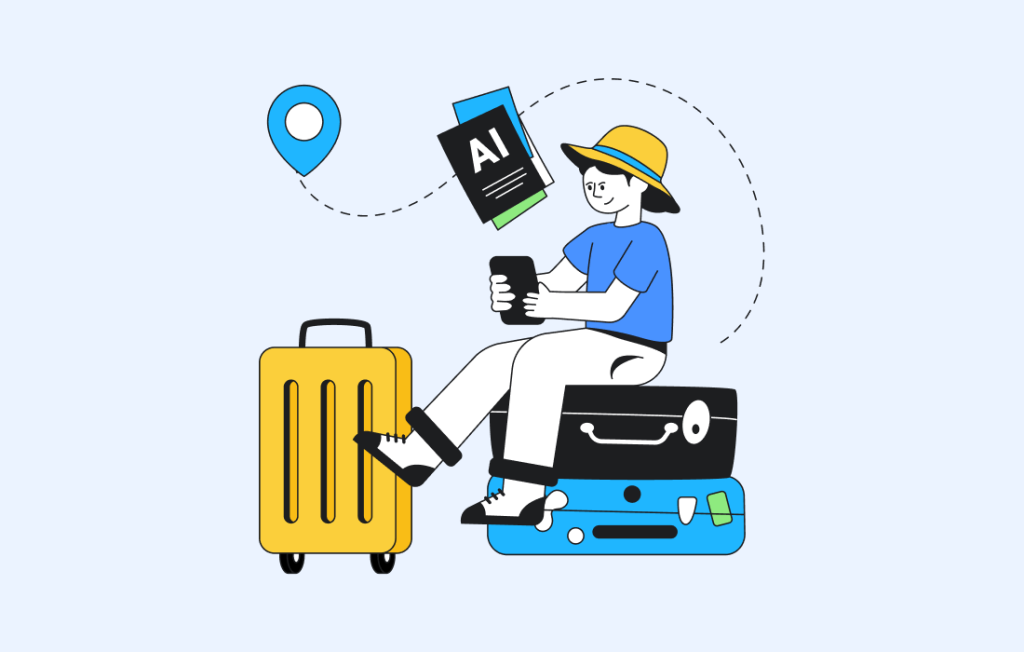Using AI Tools to Plan Your Trip Abroad: The Ultimate 2026 Guide
Planning a trip abroad can be both exciting and overwhelming. Between choosing destinations, booking flights, arranging accommodation, and creating itineraries, travelers often find themselves juggling a million details. Thankfully, AI tools are transforming travel planning, making it faster, smarter, and more personalized. This guide explores how to use AI tools to plan your trip abroad, the benefits, types of AI tools available, and tips for getting the most out of them.

1. Why Use AI Tools for Travel Planning?
AI, or artificial intelligence, uses machine learning, natural language processing, and predictive analytics to simplify and optimize travel planning.
a. Benefits of AI Tools
- Personalized Recommendations: AI analyzes your preferences to suggest destinations, activities, and accommodations.
- Cost Optimization: AI can predict the best time to book flights or hotels to save money.
- Time-Saving: Automates research, itinerary building, and booking processes.
- Enhanced Safety: Provides alerts for travel advisories, weather updates, and local regulations.
- Dynamic Adjustments: AI tools can adapt your plans in real-time based on delays, cancellations, or changing conditions.
In short, AI helps travelers make smarter decisions with less effort, ensuring a smoother and more enjoyable trip abroad.
2. Types of AI Tools for Planning a Trip Abroad
AI tools for travel fall into several categories, each serving a different purpose.
a. Flight and Transportation AI Tools
- Skyscanner and Hopper: Predict the best times to book flights and suggest price trends.
- Google Flights: Uses AI to recommend alternate dates and airports to save money.
- Rome2rio: Combines AI with mapping technology to suggest multiple transport options, including flights, trains, and buses.
Tips:
- Use fare alerts to monitor flight prices.
- Compare multiple AI tools to ensure you’re getting the best deals.
b. Accommodation AI Tools
- Booking.com and Airbnb AI Features: Suggest properties based on past searches, reviews, and traveler ratings.
- HotelTonight AI: Uses machine learning to offer last-minute deals.
- Traveloka and Agoda AI: Provide personalized recommendations considering budget, amenities, and location.
Tips:
- Input your preferences clearly: budget, type of stay, and desired amenities.
- Read AI-suggested reviews critically—they’re summaries of human reviews, not replacements.
c. Itinerary Planning AI Tools
- Utrip and Inspirock: AI analyzes your interests, travel dates, and destination to create optimized itineraries.
- TripHobo: Suggests attractions, local experiences, and routes to minimize travel time.
- Google Travel: Uses AI to suggest day plans based on popular spots and your interests.
Tips:
- Customize AI-generated itineraries to include your personal must-see spots.
- Factor in rest and flexibility—AI can’t account for every fatigue or mood variation.
d. Travel Budget AI Tools
- TravelBank and TripCoin: AI analyzes your planned activities, accommodations, and flights to create budget forecasts.
- Mint or PocketGuard: Not strictly travel tools, but AI-powered personal finance apps help you allocate funds for international trips.
Tips:
- Update AI tools with actual costs for more accurate budgeting.
- Include hidden costs like visas, travel insurance, and local transport.
e. Local Experience AI Tools
- Detour and LikeALocal: AI recommends off-the-beaten-path attractions, restaurants, and cultural experiences.
- TripAdvisor AI Features: Suggests activities based on reviews, seasons, and your preferences.
- ChatGPT Travel Plugins: Can generate tailored daily itineraries, suggest local etiquette tips, and provide real-time updates.
Tips:
- Cross-check AI suggestions with local sources for current relevance.
- Use AI for discovery but maintain personal flexibility and curiosity.
3. How AI Improves Travel Safety
Traveling abroad involves risks, and AI can help mitigate them.
a. Real-Time Alerts
- AI tools can notify you about flight delays, cancellations, and traffic disruptions.
- Some apps provide weather warnings and natural disaster alerts.
b. Health and Safety Updates
- AI can provide information on local healthcare facilities, vaccination requirements, and travel advisories.
- AI-driven apps like SmartTraveler and Google Travel offer up-to-date safety information per destination.
c. Language and Navigation Assistance
- AI-powered translation apps like Google Translate or DeepL allow travelers to communicate with locals effectively.
- AI navigation tools, including Waze and Google Maps, optimize routes and suggest safer travel options.
4. Using AI for Sustainable Travel
Sustainable travel is increasingly important, and AI can help you reduce your environmental impact.
- Carbon Footprint Calculators: Tools like MyClimate AI suggest greener travel alternatives and offset options.
- Eco-Friendly Accommodation AI: Platforms highlight sustainable hotels, hostels, or rentals.
- Smart Itinerary Planning: AI can suggest routes and modes of transport that minimize emissions.
Tips:
- Combine AI recommendations with personal choices to ensure authentic experiences.
- Choose local transportation and sustainable accommodations when possible.

5. How to Effectively Use AI for Trip Planning
To get the most out of AI tools while planning your trip abroad, follow these strategies:
a. Start Early
- Use AI tools months in advance to compare flights, accommodations, and activities.
b. Combine Tools
- No single AI tool does everything. Combine flight, hotel, itinerary, and local experience AI apps for a complete plan.
c. Personalize Inputs
- The more specific your preferences, the better the AI recommendations. Include interests, budget, travel style, and dietary preferences.
d. Verify AI Suggestions
- Cross-check information, reviews, and costs. AI reduces effort but human verification ensures accuracy.
e. Stay Flexible
- AI can predict trends and make suggestions, but travel involves uncertainty. Be ready to adjust plans.
6. AI Tools and Travel Trends for 2026
AI travel technology is rapidly evolving, and these trends are expected to shape trips abroad in 2026:
- Voice-Activated Travel Planning: Speak to AI assistants to book flights, hotels, and activities instantly.
- Predictive AI for Cost Savings: More advanced predictive models will forecast flight and accommodation deals months ahead.
- AI-Powered Virtual Reality Previews: Check hotel rooms, attractions, and walking routes virtually before arrival.
- Integrated AI Travel Apps: Platforms combining itinerary planning, budgeting, translation, and local experiences in one app.
Travelers in 2026 will be able to plan smarter, faster, and safer trips using AI more seamlessly than ever.
7. Common Misconceptions About AI in Travel
- “AI replaces human decision-making.”
- False. AI is a tool for efficiency and suggestions; human judgment ensures personal preference and flexibility.
- “AI always finds the cheapest option.”
- Not necessarily. AI predicts trends, but booking timing, promotions, and human choices still matter.
- “AI eliminates surprises.”
- AI helps reduce uncertainty but travel is inherently unpredictable. Use AI as guidance, not a guarantee.

8. Final Thoughts
Using AI tools to plan your trip abroad in 2026 allows travelers to save time, reduce costs, optimize itineraries, and make informed decisions. From flights and accommodations to local experiences and safety alerts, AI offers personalized insights that enhance travel while keeping it stress-free.
However, the human touch—intuition, curiosity, and flexibility—remains essential. The best trips combine AI efficiency with personal exploration, cultural immersion, and memorable experiences.
AI is not just a tool; it’s a travel companion helping you explore the world smarter, safer, and more enjoyably.